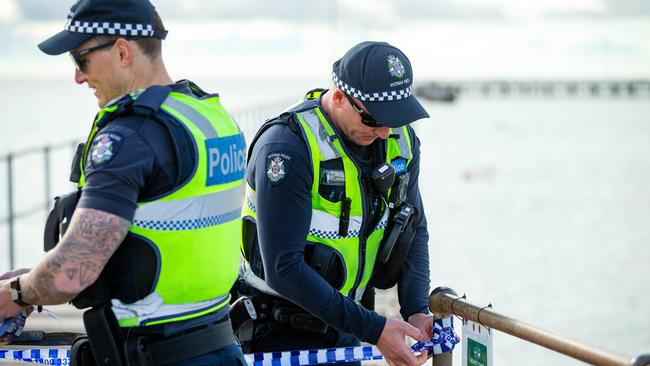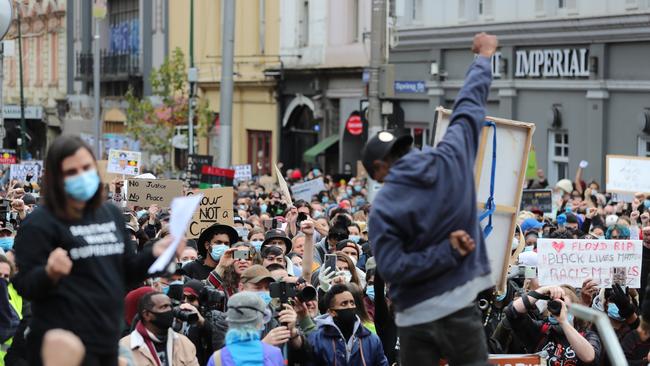
When I get pulled up tomorrow morning at an ocean pool off the coast of Sydney and am told I can’t swim yet because there are three people in the water and seven people getting changed on the nearby ledges, can I dodge the 10-people rule if I claim my laps are a form of protest?
This is not a joke. And it has nothing to do with the abominable killing of a black man in Minneapolis. This is about debunking the fatuous myth that there is any kind of equality of sacrifice when it comes to the application of laws that have constrained lives, destroyed livelihoods, closed borders, wrecked businesses, disrupted schooling, shut down the footy and kept families apart.
Politicians should understand better than most that when they, and their laws, become objects of derision, it’s a sure sign that trust in authority is tanking.
Two days after the protests in Melbourne, Victorian police shut down Rye pier on the Mornington Peninsula after crowds went fishing without observing social-distancing rules. Not so long ago, two people sitting on a park bench in Sydney were moved on by heavy-handed police officers. A 17-year-old learner driver out for a lesson with her mum was fined in Melbourne for breaching public-health orders. Medical experts and Victorian police officers said the woman deserved the fine because driving lessons were “not essential travel”.
In NSW, police stood on the rocks of a small bay telling people to get out of the water, even though they had no power to do so. In Victoristan, Premier Daniel Andrews told partners who lived in different houses that they could not legally spend time together. That is “not care”, he said, before being rolled. Barely a month ago, golf was banned. Andrews claimed it would endanger lives.

Hundreds of Australians have been hit with fines for breaching public-health orders. But when protesters took to the streets in their thousands across Australia last weekend, the police did nothing. Those politicians who joined the protests in effect said there was one rule for them, another rule for us. Labor MPs Graham Perrett, Anika Wells, Warren Snowdon and Malarndirri McCarthy and Greens senators Mehreen Faruqi and Janet Rice made a mockery of the rule of law.
Why wouldn’t normally law-abiding Australians make fun of these laws?
It was bad enough when some of the really dumb COVID-19 laws lacked common sense. But when enforcement of more serious laws — those preventing mass gatherings — became arbitrary, this became a fundamental issue of fairness.
There are two possible explanations for these double standards. Either protesters, police and state governments are stupid. Or they think we are stupid. Clue: it’s not the latter.
If protesters genuinely wanted indigenous disadvantage to be taken seriously by more Australians, they went about it the wrong way. You don’t make friends or influence people by ignoring laws that millions of Australians have dutifully followed in an effort to contain a pandemic.
Instead, expect a backlash, especially now that one protester in Melbourne has been confirmed as carrying the highly contagious coronavirus.
Protesters could have asked Australians to join small vigils that complied with COVID-19 safety rules. They chose crass and short-lived exposure over longer-term credibility.
Politicians seem to think we’re stupid too. Though Andrews and other premiers said protesters should stay at home, there have been few repercussions for law-breakers, and all too late. Yet, within days of the protests, the NSW Premier said authorities would punish any business that breached public-health orders.
Maybe Sal Navarra, who runs one of Sydney’s largest wedding-venue chains, should have a Black Lives Matter banner in his office when police come for him. After tens of thousands of protesters swarmed Sydney’s city streets, the Navarra Venues chief executive told The Australian this week that he would ignore coronavirus restrictions and offer wedding receptions “of any size”.
The day after Navarra announced he was planning to reopen because he had enough of dealing with “upset brides”, the NSW Premier announced a further easing of restrictions in her state. “You will be able to welcome 20 people into your home as well as having gatherings outside with 20 people,” Gladys Berejiklian said on Thursday morning.
Hold the applause. Berejiklian and other state leaders have a much bigger problem on their hands than upset brides limited to 20 guests.
When freedoms become arbitrary, available to some but not others, when double standards determine who cops a fine, it demolishes the idea of a fair go.
In NSW, law and order has descended into a complete farce.
In reasons released this week, the NSW Court of Appeal found that in the days leading up to last Saturday’s Black Lives Matters protest, Chief Inspector of Police Paul Dunstan worked with protest organiser Raul Bassi to amend his original notice seeking permission to protest to reflect an increase from 50 people to 5000 people. In other words, from the get-go, NSW Police sanctioned a protest that was clearly in breach of public health orders that limited outdoor gatherings to 10 people.
Law and order can break down in many ways. A policeman killing a man by kneeling on his neck for almost nine minutes is one sure-fire way. Another way is when police apply laws in an arbitrary fashion, effectively telling citizens they don’t respect the laws.
No wonder Australians are more fired up than ever about being told they can’t have more than 20 people to their wedding, more than 50 people to a funeral or more than 50 people in their restaurant or pub.
Most people don’t talk about individual liberties. That is too abstract. The language of middle Australia is more practical. They talk about a fair go. They expect Australia to be an egalitarian country — no more, no less — where laws apply equally to all. It doesn’t need to be written into the Constitution; egalitarianism is stamped on our national psyche.
The clash of values between noisy protesters and middle Australia will only add political heat to labels such as “forgotten Australians”, the “silent majority”, and “quiet Australians”.
It’s a safe bet that middle Australia won’t be impressed by statues being torn down by mobs either, and politically correct types removing Gone With the Wind, Little Britain and Chris Lilley’s comedies from our screens. There is always an equal and opposite response; witness the rise of Donald Trump. Quiet Australians are entitled to wonder what happened to the land of the fair go.
With more protests planned for this weekend, the showdown is set to get worse.
Millions of Australians will be watching, deciding if they should also flout laws. When police and political leaders lose control over thousands of people, it can fast become a deeper issue of legitimacy for millions more.




If I ran a pub in South Australia, a restaurant in Western Australia or a funeral business in Tasmania, and a COVID copper came knocking on my door threatening to fine me for having too many people gathered in one spot, could I avoid it by saying “Black Lives Matter”? If I were a priest with a congregation of 21 people in my church in Melbourne, could I post “Black Lives Matter” on the hymn board to avoid the law?